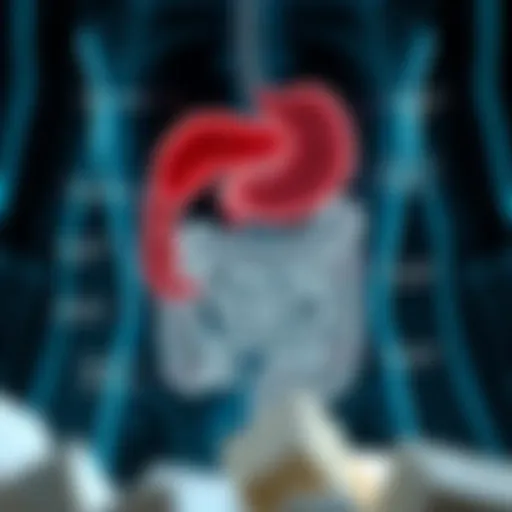Exploring the 48 Hour Juice Diet: Benefits and Insights


Intro
The 48 Hour Juice Diet has captured the interest of many who are keen on kickstarting a healthier lifestyle. This short burst of vibrant juices promises a reset—not just for the body, but potentially for the mind as well. Juice diets have long had their coupons in the realm of health and wellness discussions. Yet, despite years of debate, many people still ponder: is a juice-only regimen for a couple of days worth the hassle, or is it just another fleeting trend?
By embracing a two-day juice diet, individuals can optimize their health journey by experiencing various physical and psychological effects. Some may argue it’s a quick fix, while others see it as a step towards sustainable lifestyle changes. With an open mind and a critical eye, this article will analyze core aspects of the 48 Hour Juice Diet, shedding light on its benefits, practical applications, and considerations that one should keep in mind.
This journey through the world of juices will guide you through each element of the diet, equipping you with the information necessary to make an informed decision. We’ll touch on the physical and mental health benefits that may arise, as well as practical tips to ensure the experience feels more like a pleasant turning point rather than a grueling challenge. Strap in as we dive headfirst into the benefits of feeding your body a concentrated dose of nature's finest nutrients.
Understanding the Juice Diet
The 48 Hour Juice Diet presents a distinctive approach to nutrition that intrigues health-conscious individuals, wellness coaches, and fitness trainers alike. It’s essential to grasp the core principles and implications of this dietary practice as it offers insights into not just weight management but also detoxification and mental clarity. This short-term regimen allows participants to consume only juices derived from fresh fruits and vegetables for a period of 48 hours.
Understanding the Juice Diet is not merely about the act of juicing; it’s a multifaceted journey that intersects with historical practices, health benefits, psychological effects, and both the challenges and rewards participants might face. Engaging in this diet can serve as a reset button for one’s body and can potentially lead to a renewed appreciation for whole foods.
What is the Hour Juice Diet?
At its essence, the 48 Hour Juice Diet is a short-term dietary plan focused entirely on the consumption of freshly prepared juices. During this two-day endeavor, individuals refrain from solid food, relying solely on a variety of fruit and vegetable juices to provide adequate hydration and nutrients. This approach can appeal to those looking to break free from unhealthy eating habits, potentially shedding a few pounds while flushing out toxins.
The beauty of this juice diet lies in its simplicity. There’s no overwhelming meal prep or complex recipes—just pure, vibrant juices packed with vitamins and minerals. Many participants find that juicing becomes a creative outlet, exploring unique combinations to suit their tastes and nutritional goals. They might blend kale with green apples one day and opt for carrots and ginger the next, relishing the variety.
Historical Context of Juice Fasting
Juice fasting is not a modern concept; its roots dig deep into historical practices dating back to various ancient cultures. For example, the therapeutic use of fruits and vegetables to heal ailments can be traced back to ancient Egypt, where folks regarded certain fruit juices as medicinal. Fast forward a few centuries, and you see juice cleansing gaining traction with wellness movements in the early 20th century, when health enthusiasts experimented with cleansing routines to detoxify the body from industrial pollution and processed foods.
More recently, the late 20th century saw the rise of juice cleanses in popular culture, touted by celebrities and health gurus as a way to not only lose weight but also promote overall well-being. This resurgence has led to a kaleidoscope of juicing philosophies and practices, some of which overlap with broader detox diets.
Juicing, in a sense, is a time-honored ritual that has recently evolved into a sought-after health trend. Understanding its history allows participants to appreciate the deeper significance of choosing this 48-hour regimen, connecting personal experience with a larger narrative that spans centuries.
“Juice fasting is more than just a diet; it’s a journey back to our roots, reminding us of nature’s unrefined bounty.”
Nutritional Foundations
The Nutritional Foundations of any dietary regimen are crucial, serving as the bedrock upon which health and well-being are built. When we're diving into the 48 Hour Juice Diet, understanding these foundations isn't just about knowing what juices to drink—it's about grasping how these ingredients contribute to your overall health, what benefits they offer, and the considerations you must keep in mind. Engaging with fresh juices goes beyond mere consumption; it’s about enhancing your body's capabilities through optimum nutrition.
Essential Ingredients for Juicing
When it comes to crafting effective juices, the ingredients you choose play a significant role in both flavor and nutrition. Think of your juice as a symphony; every ingredient has its part to play. Here are a few essential components:
- Green Leafy Vegetables: Spinach, kale, and Swiss chard are not just popular tags in health circles. They are powerhouses of vitamins A, C, K, and folate. Their fibrous nature also aids in digestion, making these leafy greens a core element in juice recipes.
- Fruits: Opt for a variety of colors—each hue signals a different set of nutrients. For instance, oranges provide vitamin C, while beets add protective antioxidants. Livestrong.com often highlights the benefits of diverse fruit consumption in any diet.
- Roots and Tubers: Carrots and ginger can add sweetness and zest, respectively. Carrots supply beta-carotene, while ginger is known for its anti-inflammatory properties. Their addition enhances both the taste and health benefits of your juice.
- Spices and Herbs: Consider including fresh mint, parsley, or turmeric. These ingredients are more than just garnishes; they come packed with anti-inflammatory and digestive benefits.
By selecting these ingredients wisely, you’re not just drinking juice; you’re imbibing a concentrated form of nutrients that your body craves.
Nutritional Benefits of Fresh Juices
Drinking freshly made juice can offer a boatload of health benefits, but let’s drill down to some of the most significant ones:
- Detoxification: Fresh juices, particularly those rich in antioxidants, can help flush out toxins that have built up over time. A juice made from kale and apple, for instance, doesn't just taste good; it supports the liver in its detoxification role.
- Weight Management: Juices can be a low-calorie alternative to heavier snacks, making them a great option for those watchin their weight. Yet, they provide essential nutrients that keep energy levels stable without loading on the calories.
- Boosting Immunity: The high vitamin content in these juices, especially vitamin C from citrus fruits, strengthens the immune system. Regular intake can revitalize your defenses against illnesses.
- Improved Digestive Health: Many juices provide enzymes that help with digestion, particularly those high in fiber like pear or carrot juices. This support can lead to a healthier gut, which in turn affects overall well-being.
In short, the nutritional merits of juicing can be remarkable, if not transformative. When you choose fresh juices, you’re not merely filling your stomach; you’re nourishing your entire system.
Understanding Nutrient Absorption
One key aspect that often gets overshadowed in discussions about juicing is how our bodies absorb these nutrients. Even if you’re juicing tons of healthy ingredients, the way your body handles these nutrients can differ significantly.
- Bioavailability: This term refers to how readily a substance is absorbed in the body. Nutrients from juiced fruits and vegetables are often more bioavailable compared to their whole counterparts. This means your body can utilize them more efficiently. This is a significant point in scenarios like the 48 Hour Juice Diet where nutrient timing and availability count.
- Synergistic Effects: Certain ingredients can work better together, enhancing absorption. For instance, combining ginger with citrus juice can improve the absorption of certain antioxidants.
- Timing Matters: Consuming juices on an empty stomach allows for quicker absorption. Thus, having your juices first thing in the morning can give your body a nutrient-packed start to the day.
Conclusively, understanding how your body absorbs the nutrients from juices can be quite impactful in your journey through the 48 Hour Juice Diet. The benefits of juicing aren’t just in the act itself but also in how your body capitalizes on that pure, concentrated nutrition.
Health Implications
Understanding the health implications of a juice diet goes beyond mere weight loss or detoxifying claims often associated with such dietary practices. Engaging in a 48-hour juice-only regimen can set the stage for a deeper awareness of your body's reactions to dietary changes. Within this framework, it's critical to explore both its potential benefits and the possible risks that come along with this short-term dietary strategy, ensuring a well-rounded perspective on its efficacy and safety.
Potential Benefits of Short-Term Juice Diets


The allure of a short-term juice diet isn’t just in its ability to cleanse the body, but it resonates deeply with many health enthusiasts for several reasons:
- Nutrient Absorption: Juices can deliver high concentrations of vitamins and minerals in a readily absorbable format. You might find that a glass of kale, apple, and ginger juice packs a purée's worth of nutrients in a fraction of the time.
- Hydration Boost: Often overlooked, keeping hydrated during a juice diet can enhance your energy levels and promote better skin health. With up to 90% of your juice being water, it can actively contribute to your daily hydration needs.
- Temporary Reset: For individuals feeling bogged down by processed foods and poor-eating habits, a quick 48-hour thrall into juicing can serve as a psychological reset. It enables a break from heavy foods, offering a fresh start to a healthier routine.
- Enhanced Digestion: Juices contain enzymes that can aid in digestion. While liquids are easier for the body to process, certain juices might even stimulate digestive health due to their natural properties, like ginger and lemon or beetroot.
Thus, it’s clear that the 48-hour juice diet can harbor significant benefits, particularly as a tool for nutrient intake and digestive rejuvenation.
Possible Risks and Considerations
Nevertheless, diving into a juice diet shouldn't be all sunshine and rainbows. The following aspects warrant serious consideration before pursuing this temporary dietary path:
- Nutritional Deficiency: While juices can be dense in certain vitamins, they fall short in providing essential proteins and fats. For anyone planning to juice for an extended period, it’s crucial to remain aware of potential deficiencies.
- Blood Sugar Spikes: Many fruit-based juices can lead to a spike in blood sugar levels, especially for those with existing metabolic concerns. Balance is key; incorporating more vegetables into your juice mix can help regulate blood sugar better.
- Potential Digestive Discomfort: Some individuals may experience stomach cramps, bloating, or diarrhea when switching to a juice-only diet, particularly if their bodies aren’t used to a high intake of raw foods.
- Mindset Shift: Transitioning to a juice diet can trigger stress or anxiety for some, especially if they have a strong relationship with food. A solid mental framework is crucial when undergoing such a phase.
"Adopting a juice diet is as much about embracing change mentally as it is about physical consumption. Being prepared, both mindset-wise and nutritionally, could make all the difference in your experience."
Before embarking on a 48-hour juice journey, thorough research along with consultations with a healthcare professional or a nutritionist can enable one to navigate the intricacies while maximizing benefits and mitigating risks.
Preparing for the Juice Diet
Embarking on the 48-hour juice diet is not something to take lightly. This diet, while simplistic in its execution, often requires significant mental and physical preparation. Getting ready involves understanding the commitment one is making and setting the stage for success. Proper preparation not only enhances the experience but also maximizes the benefits one could derive from this temporary dietary change.
Mental Preparation and Mindset
Mental preparation is crucial. The juice diet predominantly comprises fruit and vegetable juices, which can lead to cravings for solid food. These cravings can be a hurdle many face during those two days. Knowing how to deal with them can make all the difference. Before starting this diet, it's essential to cultivate a mindset geared towards focus and resilience.
Start by acknowledging that this is a short commitment; 48 hours isn't forever. Remind yourself of your goals—whether it's detoxifying, losing a little weight, or simply trying out something new. Visualization techniques can be handy here. Picture yourself thriving through this experience—feeling lighter, energized, and clearer. Journaling your thoughts and intentions might help clarify why you chose to embark on this journey in the first place.
Another key aspect is understanding that mental distractions will arise. Whether it’s the aroma of a freshly cooked meal or the sight of someone enjoying a hearty snack, resist the temptation. It can be beneficial to surround yourself with activities that keep your mind engaged. Try reading a book, practicing yoga, or even taking a scenic walk in nature. Keeping yourself busy during this period can be a sound strategy to transition through the feelings of hunger and cravings.
Organizing Your Juicing Schedule
When it comes to the 48-hour juice diet, organization is half the battle won. Setting a juicing schedule can streamline your approach and reduce stress. Begin by choosing your juice recipes ahead of time. It's important to have a mix of flavors and nutrients to keep your taste buds satisfied. For instance, consider preparing a variety of combinations using ingredients like spinach, cucumber, carrots, and a hint of ginger for zest.
Some helpful tips for organizing your juicing schedule include:
- Plan Your Shopping: Gather all necessary ingredients for your juices a few days before starting the diet. Make sure to select fresh, organic produce for maximum nutritional benefits.
- Juicing Ahead: If juicing in real-time feels daunting, consider juicing in bulk. You can prepare some juices and store them in airtight containers for up to 48 hours. Just remember to give them a good shake before consuming; separation can occur.
- Timing Your Juices: Spread out your juice consumption throughout the day. Aim for every two to three hours to keep your energy levels stable and hunger at bay. You might choose a schedule like this:
- Morning: Green juice for a refreshing start.
- Mid-Morning: A fruity juice full of vitamins.
- Afternoon: A zesty combo with citrus and ginger.
- Evening: A calming juice with a hint of mint.
An organized plan will not just help you stay on track but will also foster a sense of control. This can be empowering as you navigate the challenges of the juice diet.
"Preparation breeds confidence!"
In closing, taking the time to mentally prepare and organize your juicing schedule sets the groundwork for a successful 48-hour foray into juicing. The better prepared you are, the smoother your journey will likely be.
Executing the Juice Diet
Embarking on the 48 Hour Juice Diet can be quite the venture, but it’s crucial to understand how to navigate this short but intense period of dietary transition. The execution of the juice diet isn’t merely about consuming liquids for two days; it's about strategically setting the stage for a transformative experience that is both nourishing and enlightening.
This phase revolves around two main facets: creating flavorful and nutrient-rich juice recipes and understanding how to maintain proper hydration alongside other dietary considerations. Getting this right can be the difference between feeling rejuvenated or fatigued.
Daily Juice Recipes and Ideas
Crafting daily juice recipes tailored for the 48-hour experience is essential. Different juices pack various nutrients and flavors, thus keeping your palate engaged while ensuring your body gets the necessary vitamins.
Here are some juicy inspirations to consider:
- Green Goddess Smoothie
Fresh kale, green apples, cucumber, a squeeze of lemon, and some ginger are blended together. This recipe is rich in antioxidants and provides a refreshing zing to kick-start your day. - Carrot Citrus Refresh
Juicing together fresh carrots, oranges, and a hint of turmeric can introduce a sweet yet spicy notes to your routine, supplying a hearty dose of vitamin A and C. - Tropical Paradiso
Pineapple, mango, and coconut water blend together to create a vibrant tropical medley. This option is hydrating and energizing, perfect for an afternoon pick-me-up. - Beet Boost Juice
Combine beets with apple and lemon for a unique earthy sweetness that is visually striking. Beets are known for their health benefits, including promoting blood circulation.
When planning your daily juices, aim for a variety of colors and flavors. Hues of vibrant oranges, greens, and reds signal an array of nutrients. Mixing fruits and vegetables not only keeps the experience enjoyable but ensures you don’t miss out on essential vitamins and minerals.
Hydration and Other Dietary Considerations
While juicing is predominantly liquid-based, forgetting about hydration as a whole would be a grave mistake. Juices, despite being liquid, do not entirely equate to staying hydrated. Thus, it is beneficial to drink plenty of water throughout the day. Aim for at least 2 to 3 liters of water aside from your juices. Herbal teas can also be a soothing addition to your hydration strategy.
A few considerations to keep in mind:


- Timing Your Juices: Space your juice consumption evenly throughout the day. This strategy ensures that you are not overwhelming your system all at once. Consider setting specific intervals, like every two to three hours.
- Listen to Your Body: Pay attention to how you feel. If fatigue creeps in, it’s okay to augment your diet with a small handful of nuts or seeds. This can balance the nutrient intake while you remain primarily juiced.
- Avoid Intense Exercising: While light activity like yoga can be beneficial, intensive workouts might be counterproductive during this short detox period. Listen to your body on this one.
"The key to a successful juice diet is not merely the juices themselves but how well you manage the overall experience. "
By focusing on the ingredients and considering hydration, you set yourself up for success in executing the 48 Hour Juice Diet. Within this framework, one can achieve not only physical benefits but also gain deeper insights into personal dietary habits.
Post-Diet Reflections
Reflecting on one's journey through the 48 Hour Juice Diet is a critical component that can enhance the overall experience and future dietary choices. After the completion of such a regimen, individuals often find themselves with new insights into their bodies and their relationship with food. By taking time to examine the physiological and psychological ramifications of this two-day juice-only period, one can derive significant benefits that may pave the way for healthier, more mindful eating habits moving forward.
Reintroducing Solid Foods
Transitioning back to solid foods is akin to finding your footing again after a long while in uncharted waters. After merely subsisting on juices for 48 hours, the body will have adapted to an intense absorption of vitamins and minerals, but it might need a gentle reintroduction to the world of solids. You want to proceed with caution and consider a few key elements:
- Start Slow: Begin with easily digestible foods such as broths, steamed vegetables or soft fruits. Think of foods that are light on the stomach but provide necessary nutrients.
- Supplement Juices: When you start eating solid foods again, keep juicing. This method continues to provide hydration and nutrients while your digestive system readjusts.
- Mindful Chewing: Take the time to chew your food thoroughly. This not only aids digestion but allows your body to reconnect emotionally with food.
- Listen to Your Body: Everyone's response to reintroducing solid foods varies. Pay close attention to how your body reacts and adjust accordingly. If something doesn't sit well, don't hesitate to switch things up.
The gradual reintegration of solid foods is a crucial step in solidifying the benefits of the juice diet. It's not just about what you eat, but how you feel about those choices that has an impact.
Evaluating Your Experience
After two days of juicing, it’s important to pause and take stock of the experience. Evaluating your time spent on the juice diet could lead to personal growth, increased self-awareness, and potentially, a shift in dietary habits. Consider these thought-provoking questions:
- What Were Your Expectations? Reflect on the reasons you decided to embark on this journey. Were your goals reached? Did any surprises come your way?
- Physical Sensations: Take note of any changes in energy levels. Did you notice any variations in mood, alertness or overall sense of well-being?
- Cravings and Hunger: Did you experience strong cravings or feelings of hunger? Recognizing these elements can provide insight into your relationship with food.
- Social Impact: How did your social life adapt during this time? Did friends or family notice any changes in your behavior or energy?
In recording these experiences, one may unearth valuable lessons about health, nutrition, and personal needs that can help in planning future dietary strategies.
Long-Term Considerations
In considering any dietary approach, especially something as intensive as a juice diet, it’s crucial to think beyond the initial two-day experience. Long-term considerations can greatly impact the benefits and sustainability of following a juice-centric regimen. By understanding how juices fit into your broader lifestyle and nutritional goals, you can make informed decisions that support your health journey over time.
Incorporating Juices into a Balanced Diet
Juices can supplement a well-rounded dietary pattern rather than serve as a replacement. This means not just seeing them as a short-term fix but thinking how they can blend into your regular eating habits. Incorporating fresh juice into daily meals can be a delightfully vibrant way to enhance your overall nutrient intake.
- Pair Juices with Whole Foods: When integrating juices, combine them with high-fiber foods like whole grains, legumes, fruits, and vegetables. This helps mitigate the high sugar content in juices while maximizing health benefits.
- Diverse Ingredients: Each juice can offer unique health properties. For instance, beet juice may boost stamina, while green juices packed with spinach or kale provide iron and calcium. Try using a variety of ingredients to target different health needs.
- Mindful Consumption: Enjoy juices mindfully, ensuring they align with your body's hunger and nutritional needs. This approach fosters a healthier relationship with food and prevents over-reliance on any single type of diet.
This incorporation should feel seamless and not forced. If you're a sprightly carrot juice fan, don't be shy about incorporating different fruits and veggies that excite your palate. When it comes to health, enjoyment shouldn't ever be sidelined.
Creating Sustainable Health Habits
Building lasting health habits involves more than just a fad diet. It's about embedding choices that resonate with your lifestyle and wellness objectives. By thinking long-term about the 48 Hour Juice Diet, you can set a foundation that promotes enduring health.
- Set Realistic Goals: Rather than trying to change everything at once, focus on actionable steps. Perhaps you begin with including one juice a day or setting aside a day each week for juicing. Goals should feel attainable and personalized.
- Reflect on Your Experiences: Take time to evaluate how the juice diet made you feel. Journaling your digestion, mood, and energy levels gives insight into what worked and how you can improve your approach moving forward.
- Seek Community Support: Engaging with others on similar health journeys can instill commitment and provide diverse strategies to stay motivated. Online platforms like Reddit or local health groups can offer shared experiences and encouragement.
A sustainable approach isn't about perfection; it's about consistency and progress. A journey of a thousand miles begins with a single step.
Scientific Perspectives
Understanding the scientific perspectives surrounding the 48 Hour Juice Diet is vital for anyone considering this nutritional regimen. This section delves into the relevant research and expert insights, offering clarity on the science of juicing. By examining the data and opinions available, readers can better grasp the efficacy and implications of short-term juice fasting, making informed decisions regarding their health.
Research Findings on Juice Fasting
Numerous studies have explored the physiological effects of juice fasting, contributing vital knowledge to the field. For instance, research from institutions such as Harvard Public Health suggests that short-term juice diets may lead to increased antioxidant levels, enhanced detoxification processes, and even temporary weight loss. This aligns with the common belief that when one consumes only juice, the body can divert its energy from digestion to cleansing and rejuvenation.
However, it’s crucial to turn a critical eye towards these studies. While there’s certainly some support for juice fasting's benefits, other research shows mixed results about long-term health impacts. A meta-analysis published in the Journal of Nutritional Science reported that while individuals often rapid weight loss, this often returns once solid foods are reintroduced. Essentially, juice diets can act as a temporary fix but might not substitute for sustainable lifestyle changes.
"Short-term juice fasting tends to be less about what is lost in terms of weight and more about what is gained in terms of psychological clarity and mindset."
— Lisa Thompson, Nutrition Researcher.
Expert Opinions on Short-Term Diets
When it comes to short-term juice diets, expert opinions can vary widely. Nutritionists and dietitians recommend caution, highlighting that while a 48-hour juice cleanse can feel rejuvenating, it may not be suitable for everyone. Some claim that a short dive into juicing can reawaken a person's relationship with food and lead them to more mindful eating practices. Others raise flags about potential nutrient insufficiencies.
Dr. June Martini, a wellness coach, suggests that juicing can be helpful for those looking to reset their dietary habits. On the flip side, she emphasizes the importance of moderation: "Juicing should not replace well-rounded meals in the long term. A couple of days of juice can be beneficial, but it must be paired with a return to balanced nutrition."
Experts also cite individual health conditions to consider, like diabetes or specific gastrointestinal issues that may contraindicate juice fasting. Thus, tailoring the approach based on personal health needs is thought to be integral.


Community Insights
Community insights play a substantial role when discussing the 48 Hour Juice Diet. Engaging with a collective of individuals who share similar experiences offers a wealth of support and understanding that one simply can’t find elsewhere. These insights not only demystify the juice diet but also provide a sense of belonging, which is incredibly valuable in the realm of health and wellness.
One of the most notable benefits of immersing oneself in a juicing community is the myriad of firsthand experiences shared by regular juice practitioners. Their stories can significantly enrich your understanding of what to expect during the diet. You might find readers or participants discussing their struggles, triumphs, and revelations, which can paint a clearer picture than any textbook or expert opinion could. Here are a few elements that highlight the importance of community insights:
- Real-Life Experiences: Success stories, challenges faced, and methods used for overcoming obstacles can prove enlightening.
- Motivation and Accountability: Having a support system can reinvigorate one’s commitment to the diet, making it less daunting.
- Resource Sharing: Recipe ideas, tips for meal prep, and suggestions on how to manage cravings can all come from fellow juicers and their dining experiences.
- Diverse Perspectives: Different viewpoints can help one to adapt the juicing regimen to fit individual lifestyles better.
Experiences from Regular Juicers
Diving into the feedback from those who have embarked on the 48 Hour Juice Diet is compelling. These individual accounts often reveal what typically isn’t spoken about in conventional health articles. For many, the first day is often their toughest. Cravings that have been silent for ages could suddenly rear their heads, leading to a battle of wills.
However, as they push through, juicers often report moments of increased clarity and energy levels that can be energizing. This contrast leads some to reassess their relationship with food and raises questions about the need for solid meals. People like Tara from New Jersey shared, "The second day brought a rush I didn’t anticipate, allowing me to be more productive than ever. I even managed to do some exercise!"
Another common theme is improved digestion and a clearer scalp in those who regularly consume juices. The body, unburdened from heavy foods, may start functioning more efficiently. Many also track their mental state and find themselves more connected to their bodies than before.
Sharing insights like these isn’t just about personal experience; it’s about fostering a deeper understanding of how our bodies respond to different dietary choices.
Support Groups and Resources
Finding community is essential, but it’s equally important to know where to look. Numerous online forums and social media groups have sprung up around the 48 Hour Juice Diet, providing a virtual gathering place for experienced juicers and newcomers alike. Platforms such as Reddit and Facebook host diverse juicing groups where individuals can ask questions, share experiences and glean insights from others.
Resources often include:
- Recipe Books: Many members share e-books or downloadable pdfs that detail juice recipes they love.
- Blogs and Podcasts: Engaging content is abundant, with various blogs dedicated to juicing adventures that often discuss preparation techniques and lifestyle adjustments that complement the diet.
- Webinars and Online Workshops: Some experienced juicers offer workshops, allowing participants to learn from the comfort of their homes.
- Local Support Groups: Depending on where you are located, local health stores or wellness centers often host juice cleanses or workshops designed to foster a sense of community.
Connect with other enthusiasts reliably can offer a sense of assurance that you're not alone in this journey, further motivating you to stick to your goals and remain committed to this chosen path. Research shows that being part of a community can significantly improve adherence to dietary changes, making the journey towards healthier eating a little less isolating and a lot more supportive.
For more detailed resources, you can check out Wikipedia and Britannica.
As you ponder over the idea of diving headfirst into a juice-only diet, remember that there’s a myriad of voices willing to accompany you. The meal might be liquid, but the experiences and community connections you make can be exceptionally fulfilling.
Common Questionss about the Hour Juice Diet
Understanding the common questions surrounding the 48 Hour Juice Diet is essential for those considering this unique approach to nutrition. As this diet garners attention for its potential to detoxify the body and boost energy levels, there are some significant points worth unpacking. These FAQs aim to clarify key elements of the diet, its benefits, and essential considerations for those who may want to embark on this journey.
What Can Expect from a Hour Juice Fast?
One of the primary concerns for many considering the 48 Hour Juice Diet is the overall experience. Participants often report an array of physical and emotional changes during this short fasting period. Initially, there might be feelings of hunger, but many find that it diminishes after the first day. It’s not uncommon to experience bursts of energy, enhanced mental clarity, or even slight irritability as the body adjusts. This type of diet can also prompt reflections about addiction to food and rituals surrounding eating.
Are There Specific Juices Should Use?
When following this juice diet, selecting the right ingredients is crucial. A well-rounded mix typically comprises fruits and vegetables that are nutrient-dense. Here’s a quick rundown:
- Fruits: Apples, oranges, and berries bring natural sweetness and antioxidants.
- Vegetables: Kale, spinach, and carrots introduce a good dose of vitamins and minerals.
- Extras: Adding ingredients like ginger or turmeric can enhance flavor and provide anti-inflammatory benefits.
A common misunderstanding is thinking all juices are equal; some can be loaded with sugar. Careful selection ensures that you gain the health benefits without unnecessary calories.
How Will This Affect My Digestion?
Embarking on a juice-only diet shifts the typical digestive process. While you might find an initial feeling of lightness, the absence of fiber can lead to changes in digestion. For some, this can result in temporary bloating or changes in bowel movements. It’s a sign that the digestive system is responding to the absence of solid foods. However, it's important to reintroduce solid food gradually after the diet.
Is This Diet Suitable for Everyone?
Not everyone is a good candidate for the 48 Hour Juice Diet. Individuals with existing health conditions, such as diabetes, should consult a healthcare professional prior to starting. Pregnant or breastfeeding women should refrain from rapid dietary changes without professional guidance. In general, it’s best to listen to your body; if something doesn’t feel right, it’s wise to reassess.
Can Drink Water or Other Beverages?
Yes, hydration is fundamental during any diet. While the focus is on juices, you can and should drink plenty of water as well. Herbal teas are also a good option, adding variety and comfort. A favorite among many is peppermint tea, which can aid in digestion and offer a soothing effect.
How Often Can Repeat This Diet?
While doing the 48 Hour Juice Diet might be beneficial occasionally, it’s essential not to overdo it. Repeating this diet too frequently can deprive your body of essential nutrients found in solid foods. Many suggest waiting at least several weeks before attempting another juice fast, allowing for nutritional balance and recovery.
"Nutrition is not about the food you eat, but about the choices you make."
Concluding Thoughts
These FAQs not only address common concerns but also highlight the importance of being mindful about your health when it comes to short-term diets. Being informed can shape a positive experience during your 48 hour juice detox. For anyone considering the juice diet, it is vital to approach it with a thoughtful and well-structured plan, ensuring you’re not just following a trend, but actively pursuing a beneficial path to health.
For more insights, consider visiting Britannica on nutrition or exploring discussions on Reddit about juice fasting for community experiences.















